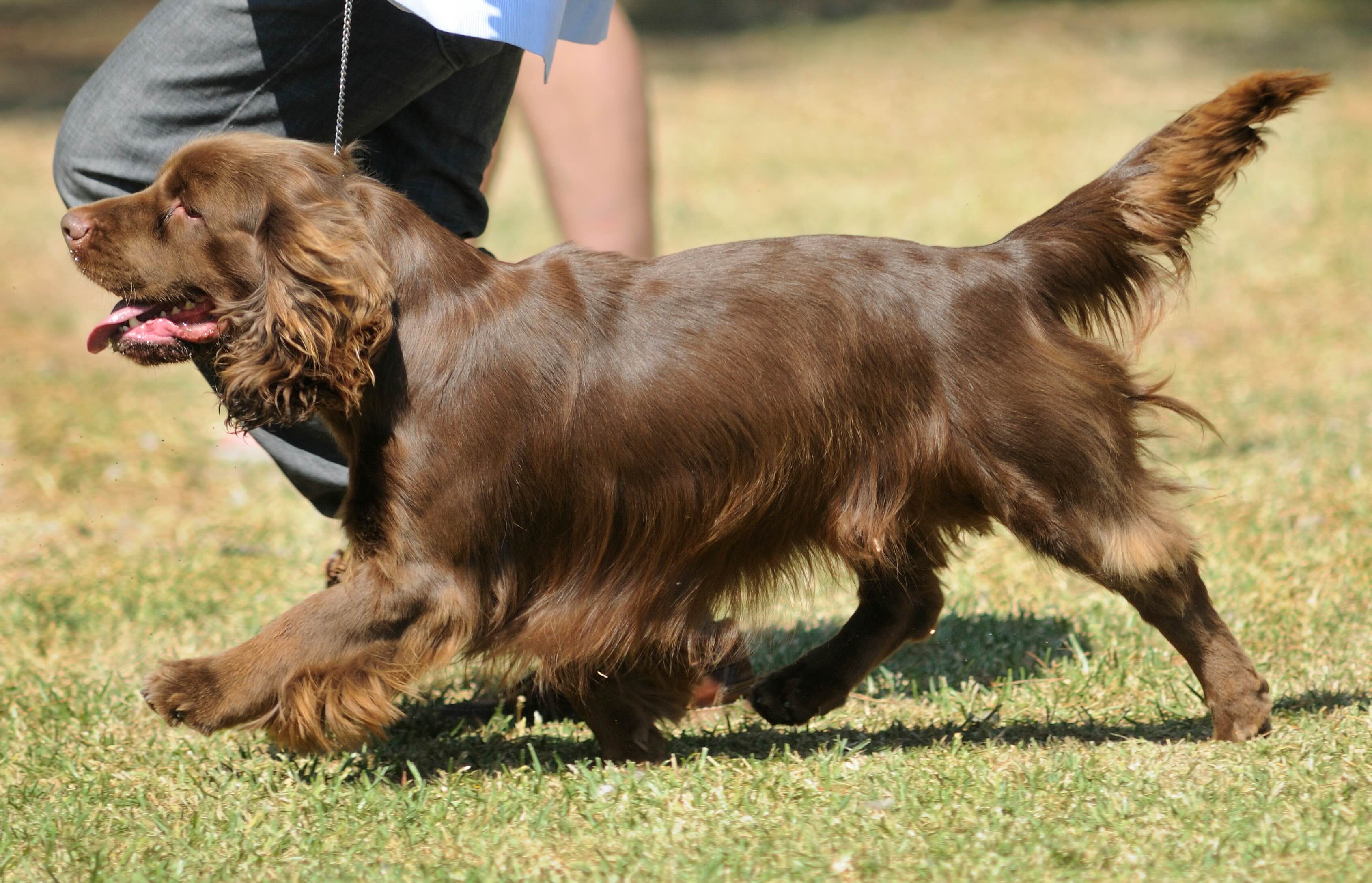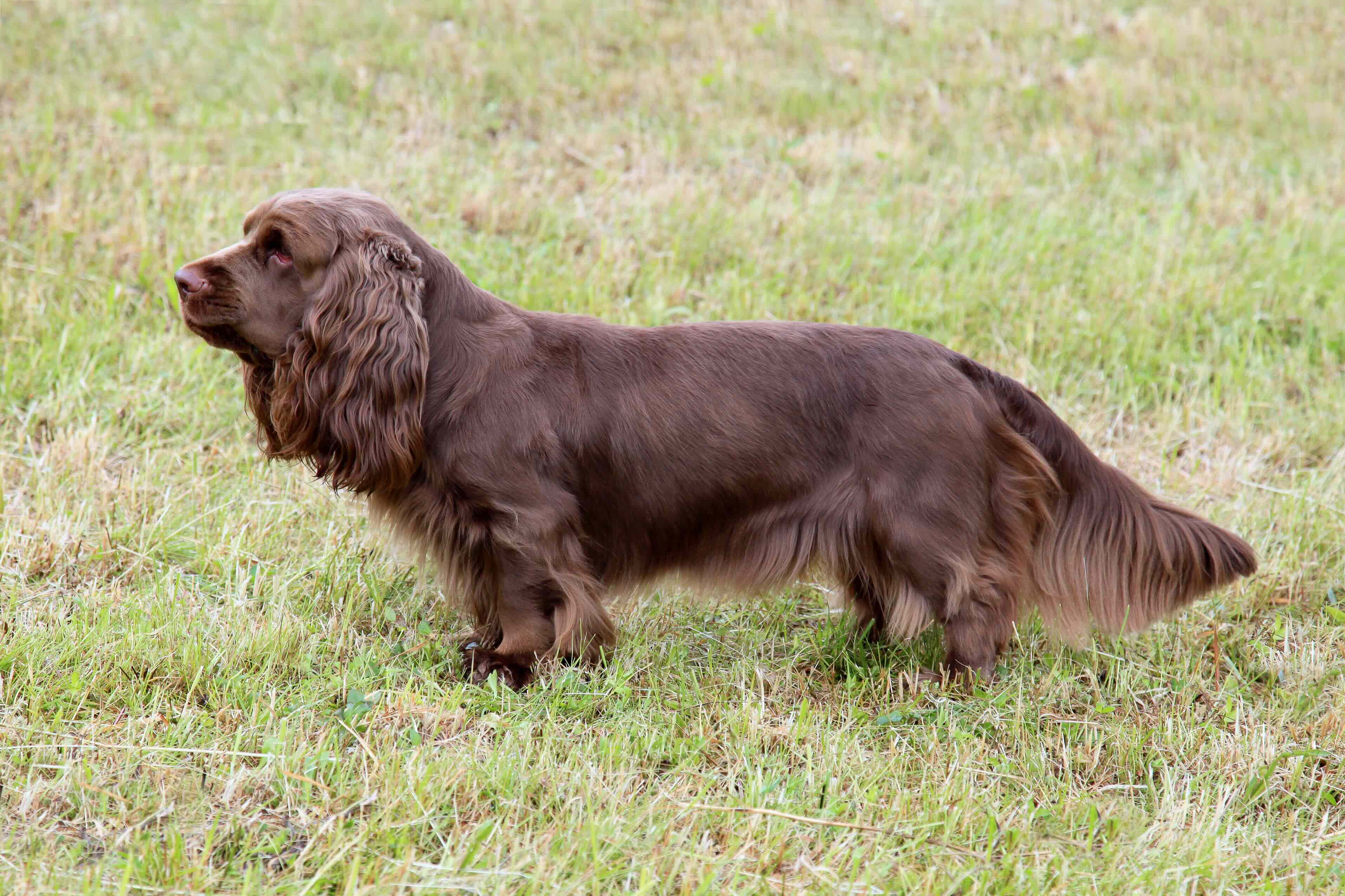Sussex Spaniel originated in Sussex, England, where the breed played as a field dog that used to find and flush games. Today the little brown dog is relatively rare in the United States
A full -grown Sussex Spaniel is 13-15 inches long at the shoulder and weighs 35-45 pounds. These dogs are recognized by their solid, golden liver rock and blocky build; They have relatively short legs and a rectangular body, so they are longer than they are high.
To take care of a Sussex Spaniel
Sussex Spaniel is a steady, friendly breed that is easy to agree with, but expects these puppies to be an active addition to your family. You have to spend time every day training your spaniel and make sure they get mental stimulation.
Instead of being independent or secluded, Sussex Spaniel enjoys time with his pet parents.
“Sussex, as a whole, is very loving and as physical contact,” says Bobby Lewis, a long -term breeder and owner of Lexxfield Sussex Spaniels. Lewis says that life with this breed is never lonely, and it is not uncommon for a Sussex to follow a person from room to room in a house.
Along with meeting Sussex Spaniel's need for activity and interaction, you must ensure that they are fed a good diet, given regular veterinary care and receive routine attention to brushing and trimming their coat.
Sussex spaniel health problems

The average Sussex Spaniel life expectancy is 13-15 years and the breed is relatively healthy. “Sussex spaniel is among the rare dog breed, but still health problems are very unusual,” says Lewis.
Although it is rare, here are some other health problems to be aware of within Sussex spaniel dog breed.
Pyruvatdehydrogenase deficiency
This genetic disorder causes a deficiency in the PDP1 enzyme and results in a build -up of lactic acid in the body. An important symptom is exercise intolerance, but the condition can be fatal.
However, a dog -DNA test can determine whether a Sussex spaniel is affected by the condition or is a carrier for the gene responsible for the condition.
Heart problems
Sometimes congenital or genetic heart deviations, such as heart disease, have been noted in the breed. Sussex Spaniel Club of America recommends a basic heart examination for puppies and further tests if there is any cause for concern.
Dysplasia with hip and elbow
Hip dysplasia is when the hip trail loosens, resulting in arthritis. Electric arch dysplasia is similar and characterized by a loose elbow joint.
Both of these joint problems can be exacerbated by obesity, so it is important to keep your Sussex Spaniel with a healthy weight. Lewis also says it is important for Sussex Spaniel puppies to avoid intensive training and stairs during their first year of life, as these activities can put too much stress on their joints.
The treatment depends on the severity of the condition. Mild to moderate cases can be handled with interventions such as medicines, joint supplements and weight management, but serious cases may need surgery.
How to feed a Sussex Spaniel
A full-grown Sussex Spaniel dog will usually do best with its daily part of the food divided into two meals a day. Most pet parents feed their dog a meal in the morning and another meal in the evening.
No special dog bowls are needed, but you should ensure that both the food bowl and the water bowl are washed regularly to prevent bacteria and mold growth.
How much should you feed a Sussex spaniel?
To determine how much you should feed your Sussex Spaniel, start by checking the feeding guidelines on the dog food package. Usually, these feeding guidelines offer a proposed daily amount to feed your dog based on their weight.
You may need to adjust based on your dog's health, activity level and body conditions. If you are not sure if you are overbearing or underage your pet, ask your veterinarian for their advice.
Nutrition tips for Sussex spaniels
Ask your veterinarian about which dog supplement – if anything – is specifically recommended for your pet before you give something to your Sussex Spaniel. This breed can benefit from some common supplements, but only on your veterinary recommendation.
Usually, dogs get all the necessary nutrients from their Aafco compatible dog food.
Tips on behavior and training for Sussex Spaniels
Sussex spaniel personality and temperament

Sussex Spaniel has a well -balanced temperament that makes them an excellent companion.
Lee Silensky, a Sussex Spaniel breeder and Vice President of Sussex Spaniel Club of America, describes the breed that is relaxed and loving and notes that these dogs like to be by your side all the time.
But far from a one-person-dog, Sussex Spaniel has plenty of loyalty and affection to share. “They bind with the whole family,” Silensky says, adding that the same applies to their younger members: “They are very sensitive and gentle on children.”
When it comes to other pets, Lewis says that Sussex Spaniel generally does well with dogs but does not necessarily long for his company. “Given a choice, I think most Sussex prefer to be the only pet in the house,” he says.
Early socialization and obedience training helps set up your Sussex Spaniel for success when you meet new animals. But when it comes to smaller animals, remember that the breed's change may mean that they see pets such as cats, rabbits or guinea pig as an opportunity for a game game.
Sussex spaniel behavior
Sussex Spaniel's even temperate disposition means that they are not too likely to be scared or anxiety, but they tend to be a little distant to strangers, says Lewis. However, the original cool reception does not last long, and these dogs are generally friendly and easy.
Keep in mind that all dogs that do not receive enough physical and mental exercise are more likely to exhibit restlessness or destructive behavior, such as chewing and digging.
This also applies to Sussex Spaniels, so continue with regular training and play time. Expect to take at least one long walk a day. “Sussex spaniel is a sporty dog and needs training and activity daily; they are not couch potatoes,” says Silensky.
While Sussex Spaniel is not known to be a big barker at home, these dogs are tuned while tracking games, releasing intermittent bark or jips as they follow the scent of a bird or rabbit.
Sussex Spaniel Training
Sussex Spaniel is generally a willing, eager to joy. Growing up to work in close collaboration with a human hunting companion, this breed is prone to look for your clues.
These attributes make a Sussex spaniel relatively easy to exercise and are suitable for many first dog parents. Always use positive reinforcement with exercise goods, dog toys and praise when exercising your Sussex Spaniel.
Fun activities for Sussex Spaniels
Sussex Spaniel Grooming Guide
Sussex Spaniel's brown coat is soft and thick, so plan on a daily brushing and often bath. If you do not mind taking care of these routine care needs, you will find Sussex Spaniel as a relatively lightholder, everything that is considered.
Skin care
Usually, Sussex Spaniel has no special skin care requirements. Silensky recommends bathing your Sussex dog about every two weeks.
Care
Keep a dog quality brush on hand and give your Sussex spaniel a daily brushing. This regular maintenance will remove loose hair and reduce emissions, plus distribute oils through the coat.
Lewis says that the spring on the dog's ears, legs and toes is particularly likely to rug, so you want to be diligent when it comes to keeping these areas combed and free from debris. A pin brush is a good choice for general use on the coat, but you can be enough for a slicker brush if your dog loses considerably or if you have serious detanging to do.
In addition, you want to trim your Sussex Spaniel's fur regularly – every two weeks. Silensky says that trimming is not intense and mainly means keeping the spring between the toes and around the feet in check. You can take your dog to a professional groomer for help.
Eye care
When you groom your Sussex spaniel, check their eyes for redness or discharge that may indicate an infection and contact your veterinarian directly if you suspect a problem.
Also, be awake for all changes in the appearance of your dog's eyes – a particularly dripping lower eyelid can be a sign of ectropion, which may cause your dog's eye to become dry and irritated.
Ear care
It is important to keep your Sussex Spaniel's ears clean and dry. Otherwise, their folded ears may develop an infection. If you notice smell or discharge from your ears, contact your veterinarian directly. Your veterinarian can advise you on how to clean the dog's ears and what ear cleaning product to use.
Considerations for pet parents

The perfect home for a Sussex Spaniel is with an active family who wants an loyal and loving companion for outdoor activities such as hiking or hunting.
While these sporty dogs are relatively compact and are not known to have a super high energy level, they are not as well suited for apartment life. “Sussex Spaniels needs a nice farm to run around and play in,” Silensky says. “Sussex Spaniels cannot be attached to small spaces.”
You don't have to complicate much about their care, but they should brush daily to keep their rich brown coat look best. Regular training will keep this robust dog's weight in check, and you want to actively keep their minds with regular workouts and games.
If you can meet these needs and give an abundance of affection, this little brown dog may be your perfect match.
Sussex spaniel common questions
Is Sussex Spaniel good pets?
Yes. Since Sussex Spaniel is anxious to please and bind with his family, this dog breed makes a very good pet for both new and experienced dog parents.
“The breed has a calm nature that works well in most household environments,” says Lewis.
Why is Sussex Spaniel's so rare?
Compared to other popular dog breeds and even other types of Spaniels, Sussex Spaniel is rare. These dogs are considered a preserved, which means that breeders focus on the breed's inheritance and health rather than meet what can be popular or in demand for a pet.
Bark Sussex Spaniels a lot?
Sussex Spaniels are known to bark to communicate during hunting, and they can trust the same communication method to warn or get involved in relaxed, everyday scenarios. That said, Sussex Spaniels does not have a reputation for inconvenience barking at home.

